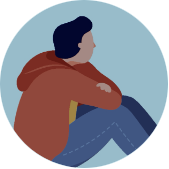Are your chronic migraines leaving you in the dark?
Are you sick of missing work, cancelling plans, and suffering through the awful symptoms that come with your migraines?
Every migraine sufferer knows what it’s like to live in fear of “the next big one”—but who can afford to keep their life on hold?
Nobody deserves to feel this way. Let’s break the stigma of migraine and try to find a positive way forward—together.
See if you can join other migraine sufferers participating in a clinical trial. Learn more about what options are available to you.
Research studies are enrolling today.
Those who qualify may receive*:

Trial-related care & medical advice from local migraine specialists

Study medication

Compensation for travel
See if you qualify:
Migraine: one of the most disabling diseases on the planet.1

It’s not just about the pain.
Symptoms like nausea and sensitivity to light or sound can make it impossible to do anything. And if you suffer from chronic migraines, you likely spend a lot of time each month in the throes of a migraine.

It’s extremely isolating.
Chronic migraines can keep you from work or school, interfere with your relationships, and lower your self-esteem. People who don’t have migraines often just don’t get it. If you feel like there’s a stigma around your chronic migraine, you’re not alone.

New prevention options needed.
Migraines differ from person to person—and so can their treatment. It can be challenging to find something that works. This is why researchers are conducting a clinical trial to evaluate whether a study drug works against chronic migraine.
How does it work?
The process just takes a few minutes. Get started now.

Answer some questions about your health

Tell us a little bit about yourself

Connect to available studies in your area
Chronic Migraine FAQs

AcurianHealth helps connect people with research studies that offer experimental treatment under development. Since 1998, AcurianHealth has referred 1 million study candidates to 800 studies in 70 countries
*In a research study, the participants may receive investigational study product or may receive an inactive substance, or placebo, depending on the study design. Participants receive study-related care from a doctor/research team for the duration of the study. For studies that offer compensation, reasonable payments will be made for participation. The length of the study may vary.